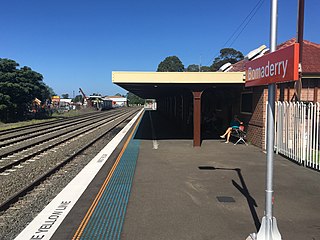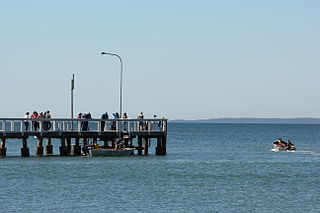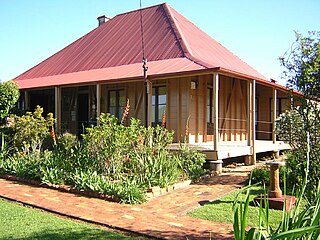
Windsor is an inner northern suburb in the City of Brisbane, Queensland, Australia. In the 2016 census, Windsor had a population of 7,013 people.

Kiama railway station is a heritage-listed intercity train station located in Kiama, New South Wales, Australia, on the South Coast railway line. The station serves NSW TrainLink diesel multiple unit trains traveling south to Bomaderry and electric multiple unit trains north to Wollongong and Sydney. Early morning and late night services to and from stations to the south are provided by train replacement bus services. It was added to the New South Wales State Heritage Register on 2 April 1999.

Berry railway station is a heritage-listed single-platform intercity train station located in Berry, New South Wales, Australia, on the South Coast railway line. The station serves NSW TrainLink diesel multiple unit trains travelling south to Bomaderry and north to Kiama. Early morning and late night services to the station are provided by train replacement bus services. In the past, the station precinct also catered to freight trains carrying cattle and dairy products.

Bomaderry railway station is a heritage-listed single-platform intercity train station located in Bomaderry, New South Wales, Australia, on the South Coast railway line. The station serves NSW TrainLink diesel multiple unit trains to Kiama. Early morning and late night services to the station are provided by train replacement bus services. A siding near the station is used by freight trains operated by the Manildra Group.

The Weald and Downland Living Museum is an open-air museum in Singleton, West Sussex. The museum is a registered charity.

Shorncliffe is a coastal north-eastern suburb in the City of Brisbane, Queensland, Australia. It is on the shore of Bramble Bay, part of Moreton Bay. In the 2016 census, Shorncliffe had a population of 1,870 people. The suburb attracts visitors to its historic Shorncliffe pier, and Lovers Walk, a walking path along the coastline between Shorncliffe and neighbouring Sandgate.

Bayswater is a suburb 6 kilometres (4 mi) north-east of the central business district (CBD) of Perth, the capital of Western Australia. It is just north of the Swan River, within the City of Bayswater local government area. It is predominantly a low-density residential suburb consisting of single-family detached homes. However, there are several clusters of commercial buildings, most notably in the suburb's town centre, around the intersection of Whatley Crescent and King William Street and a light industrial area in the suburb's east.

Wellington Point is a residential locality in the City of Redland, Queensland, Australia. In the 2016 census, Wellington Point had a population of 12,350 people. The suburb is a popular seaside destination within the Brisbane metropolitan area and is notable for a popular walk along a sandbar to King Island which emerges at low tide.
Kingsley is in Harford Township, Susquehanna County, Pennsylvania, United States. Kingsley was named after Revolutionary War veteran Rufus Kingsley, who had been the first settler in the area.

Still River Baptist Church is the home of the Harvard Historical Society. It is an historic Gothic Revival-style meeting house located at 213 Still River Road in Harvard, Massachusetts. The building houses the Harvard Historical Society's museum and archival collections.

Ditchling Unitarian Chapel is a Unitarian chapel in Ditchling, a village in the English county of East Sussex. A congregation of General Baptists began to meet in the 17th century in the village, which was a local centre for Protestant Nonconformist worship, and by the time the present simple Vernacular-style chapel was constructed in 1740 a large proportion of the population held Baptist beliefs. Along with other General Baptist chapels in Sussex, the congregation moved towards Unitarian views in the mid-18th century; this caused a schism which resulted in a new chapel being formed at nearby Wivelsfield. The character of the Ditchling chapel was wholly Unitarian by 1800, and it has continued under various names since then. People associated with the chapel include William Hale White, Henry Acton, Adrian Boult—who was married there—and G. K. Chesterton. The chapel is set back from Ditchling's main street and has an adjoining house and graveyard, all of which contribute to the character of the conservation area which covers the centre of Ditchling village. English Heritage has listed the chapel at Grade II for its architectural and historical importance.

Christ Church Cathedral is a heritage-listed Anglican cathedral complex at Duke Street, Grafton, Clarence Valley Council, New South Wales, Australia. The cathedral was designed by John Horbury Hunt and built from 1874 to 1884 by Reynold Brothers (brickwork) and G. J. T. Lawson (woodwork). It is also known as Cathedral Church of Christ the King and Grafton Anglican Cathedral. The property is owned by the Anglican Diocese of Grafton. It was added to the New South Wales State Heritage Register on 14 March 2003.

South Brisbane Library is a heritage-listed former library at 472 Stanley Street, South Brisbane, City of Brisbane, Queensland, Australia. It was designed by Francis Drummond Greville Stanley and built from 1881 to 1902 by W Macfarlane. It is also known as South Brisbane School of Arts, South Brisbane Mechanics Institute, South Brisbane Technical College, and South Brisbane Post & Telegraph Office. It was added to the Queensland Heritage Register on 21 October 1992. It now houses the Griffith University Film School, which forms part of the Queensland College of Art.

Wolston House is a heritage-listed museum and former homestead at 223 Grindle Road, Wacol, City of Brisbane, Queensland, Australia. It was built from 1852 to 1860s. It was added to the Queensland Heritage Register on 21 October 1992. It is now a historic house museum operated by the National Trust of Queensland.

Caboonbah Homestead was a heritage-listed homestead at Esk-Kilcoy Road, Lake Wivenhoe, Somerset Region, Queensland, Australia. It was built from 1889 to 1890. It was added to the Queensland Heritage Register on 12 December 1996. It was destroyed by fire in 2009 and removed from the Queensland Heritage Register in 2014.

Pioneer Cottage is a heritage-listed homestead at 5 Pioneer Crescent, Buderim, Sunshine Coast Region, Queensland, Australia. It was built c. 1882. It is also known as JK Burnett residence. It was added to the Queensland Heritage Register on 21 October 1992.

The Community of the Sacred Name is a community of nuns in the Anglican Church in Aotearoa New Zealand and Polynesia. CSN Sisters currently live in Christchurch, Ashburton, Nukualofa and Suva. The former Motherhouse of the community including convent, chapel and novitiate stood in the central city of Christchurch, New Zealand.

Milton State School is a heritage-listed state school at Bayswater Street, Milton, City of Brisbane, Queensland, Australia. It was built from 1923 to 1936 by Queensland Department of Public Works. It was added to the Queensland Heritage Register on 28 April 2017.
Kingsley Wayne Dixon is an Australian botanist currently working as a professor at Curtin University. He was the founding Director of Science at Kings Park and Botanic Gardens, and helped to establish the laboratories there as among the world's leading.

The Pensioner Guard Cottage is a historic building in the Perth suburb of Bassendean, Western Australia. It is the oldest building in Bassendean, built between 1855 and 1857 by ticket of leave convicts staying at the Guildford convict depot. It was built with a group of three other similar cottages in Bassendean whose purpose was to house Pensioner Guards. In 1893, a house was built adjacent to the cottage. The other three cottages were demolished during the first half of the 20th century, and the house was significantly expanded in 1952.



















